Texas Orange Jackets Celebrates Centennial
Texas Exes’ Distinguished Alumni aren’t the only exclusive group to sport burnt-orange outerwear. You’re likely to see distinctive orange vests on the Darrell K Royal-Texas Memorial field corralling young Longhorns for the Hook ’Em Herd field dash or serving alongside Texas Blazers as official hosts for the University.
Texas Orange Jackets was founded in 1923 as a women’s honorary service organization and is now one of the oldest organizations of its kind at UT. Members and alumni will celebrate Orange Jackets’ 100th anniversary with a weekend-long celebration in Austin this November.
Events will honor each of the organization’s four tenets: leadership, scholarship, service, and community—the newest tenet, added in 2020.
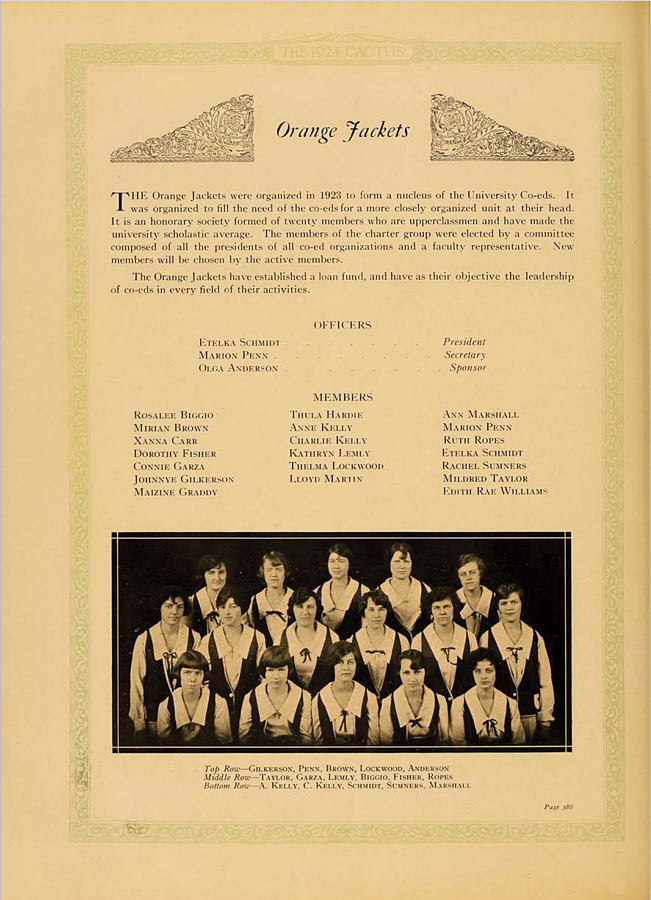
“Community is what really connects the tenets and makes them all work together,” says Anna Alvis, the current Orange Jackets president and a senior studying Plan II Honors, linguistics, Chinese, French, and Philosophy of the Mind and Language.
“We’re connected by passion, whether that’s passion for UT, for your community, or for a very niche interest,” Alvis says. “It’s refreshing to be around people who are just as driven as you, but in a completely different direction.”
The organization’s current co-advisor, Shavonne Henderson, BA ’02, JD ’05, says she applied as a student because she “saw so many amazing women doing great things around campus, and they were all Orange Jackets—or Orange Jackets and also members of my sorority,” Alpha Kappa Alpha. (The first Black member of Orange Jackets, Donna Guess, BA ’62, was also an AKA.)
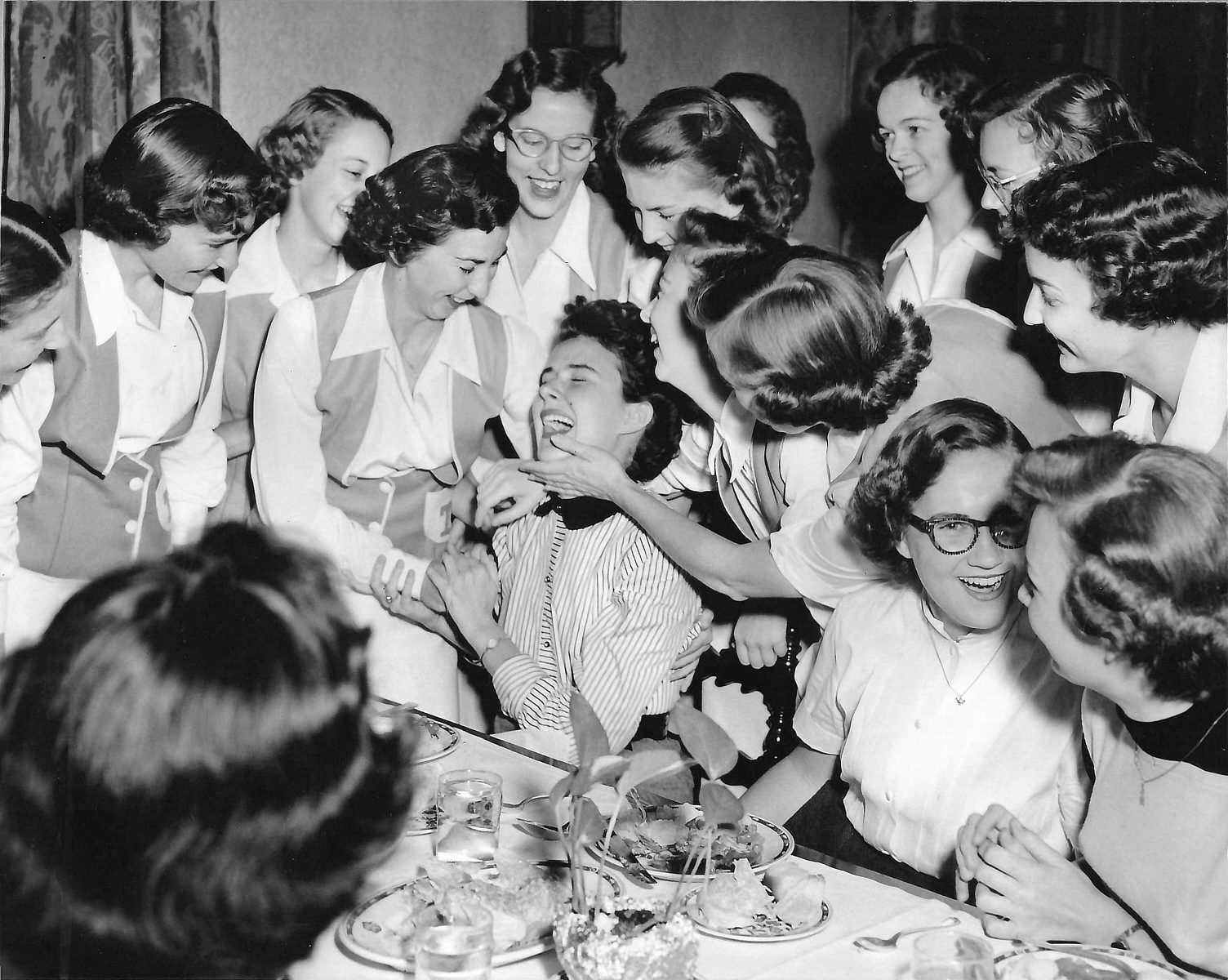
Several Distinguished Alumni earned their vests years before the Texas Exes would award them orange blazers: dean and unofficial UT historian Margaret C. Berry, BA ’37, Life Member; beloved UT administrator Shirley Bird Perry, BS ’58, MA ’67, Life Member; and first lady Lady Bird Johnson, BA ’33, BJ ’34, BL ’64, Life Member.
Other notable alumni include Carole Keeton Strayhorn, BA ’61, Life Member, the only woman ever to be elected as mayor of Austin, and Krissah Thompson, BA, BJ ’01, the first Black woman to hold the title of managing editor at The Washington Post.
The Orange Jackets’ presence can be seen past their coordinated vests. Several significant campus features originated as Orange Jackets initiatives and Tap Projects (new members are called “Taps,” earning their vests and full membership in the organization at the completion of a year-long “Tap Project”). OJs created the University’s Parents Weekend in 1924, added emergency call boxes in West Campus in 2006, and—perhaps one of their most visible accomplishments on campus—advocated for the installment of a statue honoring State Sen. Barbara Jordan outside of the Texas Union.
“The [statue] project made us connect to the University in a very expansive way,” says Joycelyn Jurado, BS ’04, Life Member, whose 2002 Tap class worked to get the bill passed in the Texas Legislature that would provide funds for the statue’s installation in 2009. “Once we made that commitment, we were unstoppable.”
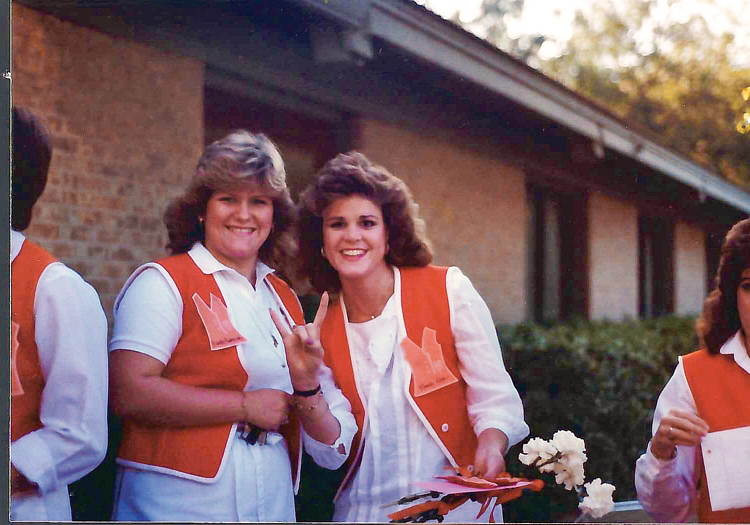
Before their project could be considered at the legislative level, however, the OJs had to harness the momentum among students, collecting signatures for a Student Government referendum on what would be the first statue of a woman on the UT campus (besides the mythical Diana in the Honors Quad).
“The match was already lit, and everybody had a role to play,” Jurado says. Within a breakneck nine months, the Taps’ idea had passed in both the Texas House and the Senate. Jurado still looks back in awe at what this accomplishment meant to her and to the community.
“When I got into OJs, it was like I was my fullest self,” she says. “I found women who saw me and understood me … I hope through the representation of a strong woman—a strong Black woman—that there are others who feel connected and seen as they come into the University.”
Henderson’s co-advisor Alexis George, BA ’12, says a quality all Orange Jackets share is “their true desire to make the University a better place—for those who are currently there, but also those who come after them.” The organization’s motto, “For Texas I Will,” reflects this “deep love for the institution.”
Former Orange Jackets president Angela Kang, BS ’20, recognizes the leadership that OJs embody. “Orange Jackets attracts individuals who are leaders in the sense of, ‘Are you going to be the type of person who does the thing that you won’t necessarily get credit for? Will you go out of your way to help someone, even if no one else is watching?’” Kang says.
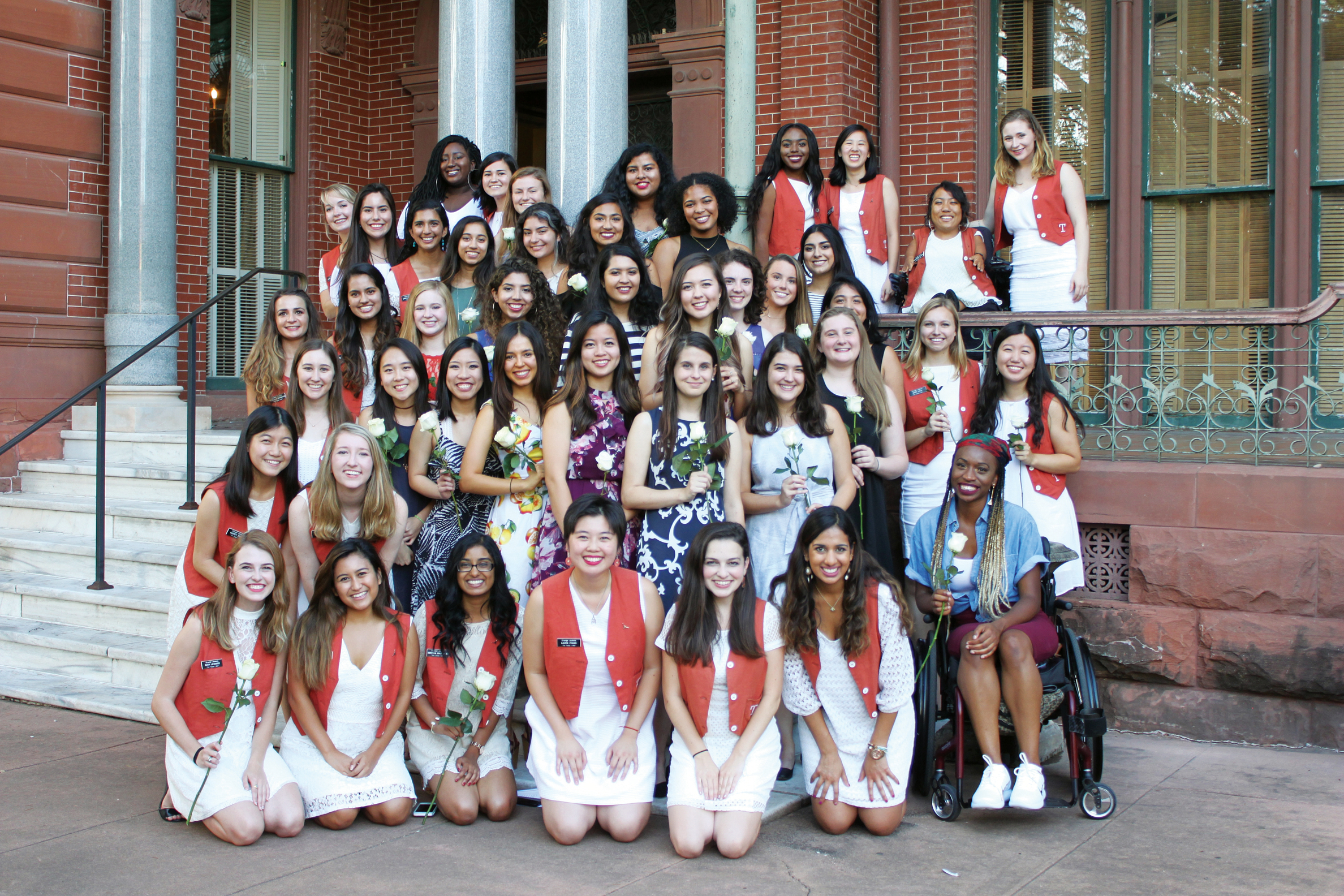
The organization has been at the forefront of numerous advocacy efforts throughout its history. OJs raised funds for Voices Against Violence, a UT program offering sexual assault counseling and education, after federal funding for the program was cut, and the organization publicly defended affirmative action in the suits brought by Students for Fair Admissions against UT in 2019 and 2020.
“Orange Jackets have had—and continue to have—a commitment to collaborative problem-solving and individual development that is not void of an understanding of a shared responsibility to the community,” Henderson says.
More recently, while current president of the Orange Jackets Network Shelby Hobohm, BA, BS, ’21, MS ’22, was serving as the organization’s financial director, she led the effort to complete the endowed scholarship for incoming freshmen of marginalized identities, established by the 2018 Tap class. In the fall of 2020, Orange Jackets raised nearly $40,000 in just over a day and a half to fully fund the endowment, four years ahead of schedule. “I don’t know how much I slept during those 40 hours,” Hobohm says.
As part of its continued evolution, Orange Jackets voted in 2020 to de-gender the organization’s constitution—which had restricted membership to female students—and open Orange Jackets to nonbinary individuals.
“It’s very easy to think about preserving the organization in its current state, and I empathize with that,” Kang says. “But the thing is, our past shows that this is exactly what the organization is meant to do … Having a service-oriented mindset means having these kinds of conversations and making these kinds of choices. It’s not productive to be fearful.”
Henderson hopes that the organization maintains that intentionality—and, Jurado adds, a sense of relevancy.
“We took a stance, and we did what we could,” she says, pausing in reflection. “I hope that OJs, in the next 100 years, continues standing up for something and taking a deep sense of pride and purpose in the communities we’re in.”
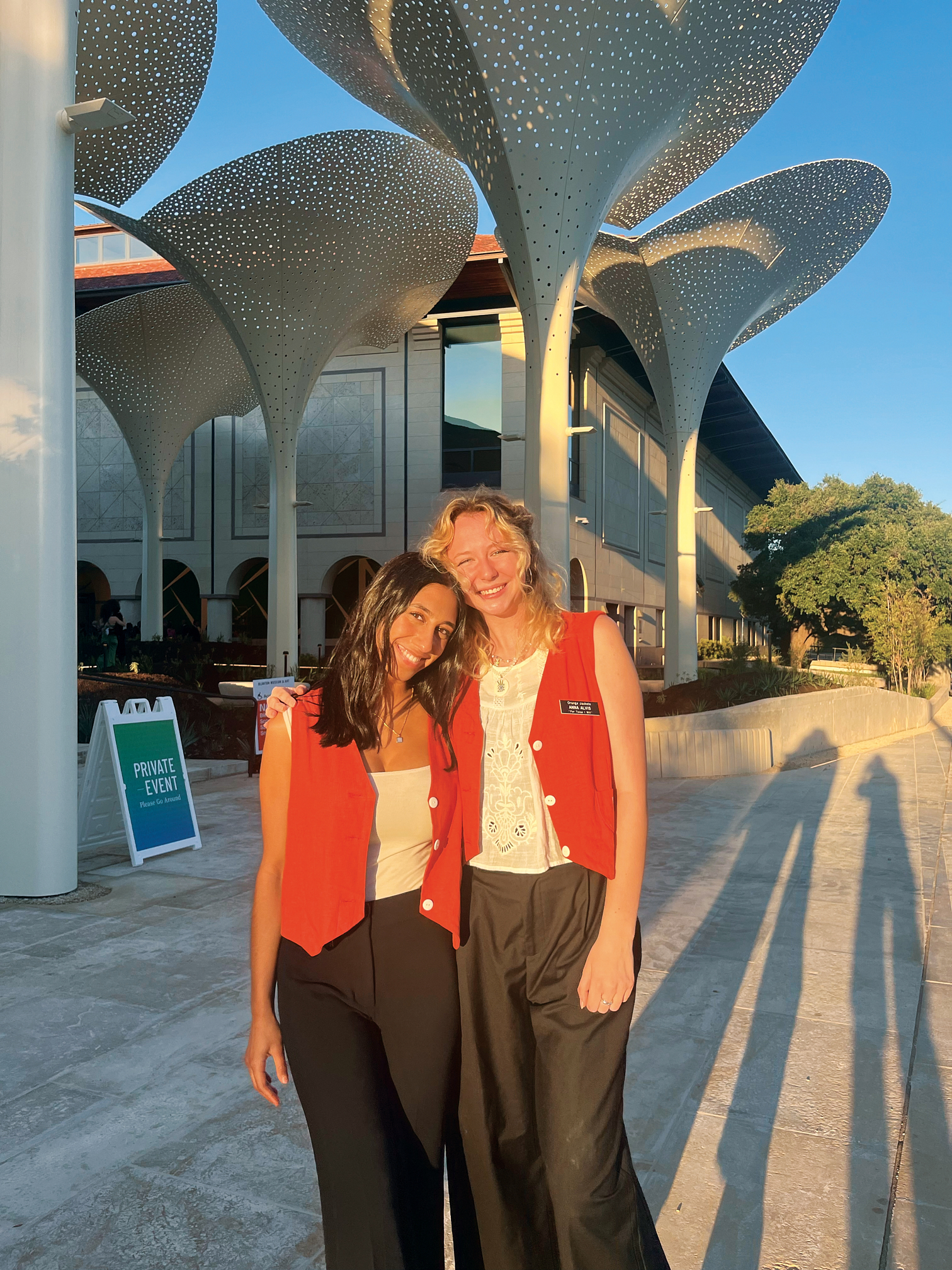
But this fall, Alvis was focused on making it through another rigorous recruitment cycle. She describes sitting in her car with one of the organization’s vice presidents after 14 straight hours of interview deliberations: “We were so exhausted that we were literally scrolling on Instagram in silence … And then I looked up, and I was like, ‘Do you think that this is what we’ll laugh about in 10 years?’”
In the 20 years since she was tapped, Jurado says her favorite memories as an Orange Jacket have occurred when she wasn’t wearing her vest.
“These are people who edited my grad school applications and were at my wedding and the birth of my children,” she says. “They have been through this life with me. And I just feel so proud and lucky that we are still connected.”
CREDITS: 1924 Cactus yearbook; Orange Jackets archive (3); courtesy of Nikita Kakkad





